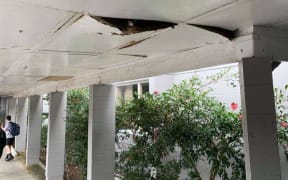The Education Review Office has found a way of helping schools that have previously defied attempts at improvement.

Photo: 123RF
The Turnaround Schools approach sees reviewers visit schools every term, and it succeeded where previous attempts had failed in five out of six schools in a three-year trial.
The Education Review Office (ERO) says 80 to 200 schools could benefit from the new form of review.
The approach was trialled in six schools for a period of three years and has now been rolled out to 20 others.
An evaluation said the six trial schools were "tier one" schools meaning they were poorly performing and/or in rapid decline, and had failed to improve during the previous four years despite being reviewed by ERO once a year or once every two years.
Principals of the schools had described problems including daily police visits to deal with student misbehaviour, badly run-down facilities, and communities with significant alcohol and drug abuse. One of the schools had 12 principals in 10 years.
The Turnaround Schools approach increased the number of ERO visits to the schools from one per year to one in each of the four school terms to focus on the school's achievement data, the report said.
It also involved a closer and more supportive relationship with the schools' leaders, and collaboration with the Education Ministry and School Trustees Association.
The approach accelerated improvement at five of the schools and principals at three of the schools said their improvements would not have happened without the reviews, the report said.
It quoted principals as saying the reviews were more helpful than regular ERO reviews.
"The model of ERO going into a school, creating havoc, walking away leaving the school to deal with the aftermath and all the blood on the floor, was one that the team discarded ... this pilot was a very different experience," said one of the principals.
"They had a genuine desire to work with us, which I really liked… In all the visits, we were able to critique and challenge any of the things that they had found or that we didn't agree with. We developed a kind of trust where we were not sort of frightened of having a 'warts and all' kind of discussion… We're working on this together. We are all wanting the same thing," said another.
Positive changes at the schools included teaching students at a level that was more appropriate to their age, improvements in NCEA achievement and in reading, writing and maths, and more positive school culture.
The six schools had not shown strong improvements in student achievement, but it could take years for that to happen, the report said.
The school that had not benefited from the trial was now being run by a commissioner.
Turnaround Schools project leader Jennifer Heath said the success of the approach was hugely significant.
"For the team working alongside the schools it's been one of those turning points in our careers around how you work alongside people," she said.
The reviews had succeeded because they allowed ERO staff to get a lot closer to the schools, she said.
"I think it's worked because we've actually been there regularly. We've actually deeply understood the DNA of what's happening in the ecosystem of the school and then what we've done is work alongside them around scaffolding and step-sequencing the pathway to improvement with them," she said.
Reviewers spent a lot of time understanding each school, working with its leaders on the priorities for improvement, and the key changes and the order in which they needed to happen.
The reviewers would also work closely with other organisations, such as the Education Ministry, to make sure the schools got the support they needed.
The approach would be used with the schools that needed it most, but the pilot had also informed ERO's approach to reviewing schools generally, Heath said.







